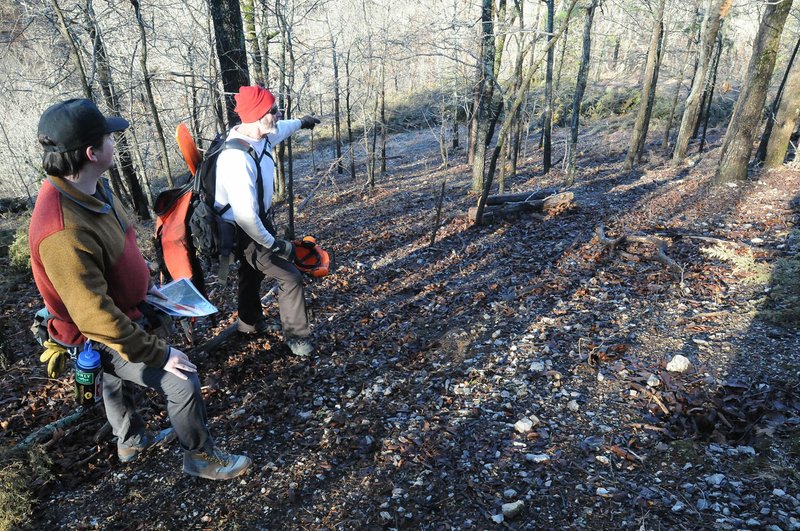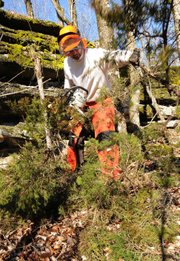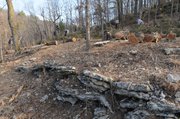Fire once did the work that chain saws do now to bring glades back to Hobbs State Park-Conservation Area east of Rogers.
More than 2,000 cedar trees have been removed from a south-facing hillside at the 12,000-acre park to restore a large glade along the Shaddox Hollow Trail in the heart of the largest state park. Eastern red cedar trees overtook the glade over decades, blocking sunshine that allows native grasses and wildflowers to thrive.
Tracts home to glades
Glades are scattered across Northwest Arkansas. Two tracts that are rich in glades are Devil’s Eyebrow Natural Area near Gateway and the adjacent Rob Walton Nature Preserve, near Garfield.
Devil’s Eyebrow takes in 2,500 acres of forest and glades. The Walton preserve joins Devil’s Eyebrow with 440 more acres, which include glades.
— Staff report
Mark Clippinger, park superintendent, cut most of the cedars himself. Volunteers and park staff moved them to the perimeter of the glade for burning.
"Before European settlement, fire kept these glades clean," Clippinger explained to a crew of volunteers during a Saturday work day Feb. 18 at the glade. In the era of Smoky Bear, wildfire was suppressed. Some glades became cedar thickets without fire.
Glades, sometimes called bald knobs, are open, rocky areas scattered throughout the Ozarks. A glade's soil is ultra thin. Rock outcrops are common. There are few trees. This openness lets the sun shine in so grass, wildflowers and glade wildlife species flourish.
Golden grass and blossoms are already springing up on the restored glade. That native plant growth will increase as spring moves into summer.
Hikers are welcome to visit the glade, but it takes some off-trail hiking. To see the glade, hike counterclockwise (right) from the Shaddox Hollow Trail parking area, one-half mile north of the Arkansas 12 and 303 junction. The path meanders on a flat course along a ridgetop. In about one-half mile, the path curves right and starts downhill. The glade is off the trail to the left, about 50 yards down the hill through the woods.
"People might wonder why we didn't reroute the trail to go through the glade area," Clippinger said. "If we did that, it'd get trampled to death."
Some of the tall cedars in the glade are left standing, but have been intentionally killed with the technique of girdling. Tree girdling involves removing a ring of bark and wood from around the base of the tree. Over time, the cedar tree dies, but is left standing for bird and wildlife habitat. Insects live in the dead tree. Birds feed on them and roost on the branches. Squirrels and other animals live in tree cavities.
Moving the 2,000 or more smaller cut cedars was no easy chore. It was hard work dragging them to the glade perimeter, mostly uphill, and scattering them. A fitting chore for strong teenage boys, such as players from the Rogers Heritage High School War Eagles football team who volunteered for the work session. It's a good service project for the players, said Kip Kruger, a coach at Heritage.
Scattering the cedars and burning them means ash gets distributed all around the glade, which is good for the forest.
Joan Reynolds, a Northwest Arkansas Master Naturalist, said land managers now see fire as beneficial to a forest. A fire keeps dead timber from accumulating and keeps undergrowth from going unchecked.
One of the reasons to restore glades at Hobbs is to increase diversity, Reynolds said. Most of Hobbs is forested. "The more diversity, with more varied plants, the whole park benefits," she added.
Reynolds is hopeful that colonies of eastern collared lizards will come back to the glades. The large lizards thrive in a glade environment.
The staff at Hobbs has identified other cedar-choked glades in the park, large and small. Clippinger hopes at least one glade can be restored each year.
Flip Putthoff can be reached at [email protected] or on Twitter @NWAFlip
Sports on 03/28/2017



